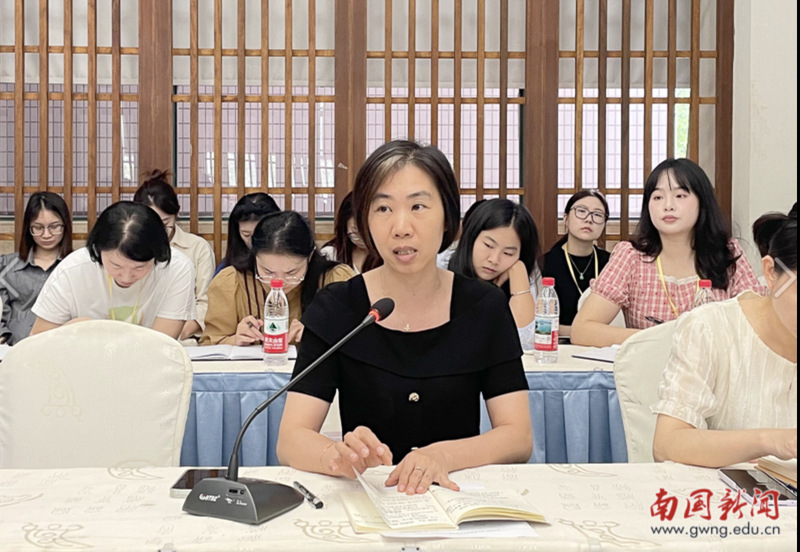Vice President Wang Guanyi Outlines Four Key Requirements at Scientific Research Work Arrangement Meeting
On September 25th, the scientific research work arrangement meeting for the first semester of the 2025-2026 academic year was held in Academic Lecture Hall C202. The meeting, themed around “High-Quality and Efficiency Development of Scientific Research Work of SCBC", summarized the achievements of the first half of 2025 in scientific research work and planned key tasks for the second half. Over 100 attendees participated. Vice President Wang Guanyi attended the meeting and delivered a concluding speech.
He highly affirmed the achievements made in the school's scientific research work. Regarding the next steps, he put forward four requirements: First, it is necessary to deeply understand the value of scientific research as the "engine" of the school's development, which is an important support for enhancing the school's competitiveness and applying for setting master's degree programs. Second, it is necessary to closely follow social hotissues and actively conduct research on specialized subjects. Third, it is necessary to break down the barriers between teaching and scientific research, allowing scientific research to inform teaching and teaching to promote scientific research, achieving the coordinated development and mutual improvement of both. Fourth, scientific research should be based on the needs of national strategies, regional socioeconomic development, and enhancing the application and transformation value of research results.
Over the next five years, SCBC will continue to improve its scientific research systems, with a focus on three major projects: preparing high-level research proposals, cultivating high-quality research achievements, and fostering the deep integration of industry, academia, and research, promoting the construction of innovative high-level universities through organized scientific research.

Conference Venue
Xu Zhichao Proposes 5 Work Requirements at Student Affairs Meeting
On September 25, SCBC convened its first student affairs meeting for the 2025 fall semester in Academic Lecture Hall C202. Party Secretary Xu Zhichao attended the meeting and delivered 5 work requirements for dealing with students’ affairs.
First, forge ahead with determination and innovation, upholding the principle of serving students' growth and development. Second, student service management and safety education must be effectively implemented, with particular emphasis on accurately assessing students' psychological well-being and strengthening mental health education and guidance. Third, proactively learn from and draw upon advanced experiences and effective practices in student affairs to ensure all tasks are executed thoroughly, effectively, and with tangible results. Fourth, establish a comprehensive and innovative working mechanism encompassing task deployment, implementation oversight, process monitoring, outcome feedback, and scientific evaluation to ensure orderly, efficient, and steady progress in all student affairs. Fifth, all student affairs personnel should remain steadfast in their educational mission and continuously elevate the professionalism of student work to actively contribute to the university's pursuit of high-quality development.



Speeches by Representatives
2025 IETRRC Annual Conference Held in SCBC
On September 27, the “2025 Annual Conference of the International Economic and Trade Rules Research Center (IETRRC),” hosted by SCBC, was held in the university's International Academic Lecture Hall. Centered on the theme “Transformation of the Global Economicand Trade Rules System and China's Practices,” the conference received strong support from China Association of Trade in Services and Guangdong Social Sciences Association. The event brought together over 200 experts and scholars from morethan 20 domestic universities, research institutions, and enterprises. Chairman Ding Xiaojun attended the conference, and President Wang Hua delivered the welcome address.
In his remarks, Li Jun, Deputy Secretary-General of the China Association of Trade in Services, called on the academic community to strengthen inter disciplinary collaboration to address emerging global economic and trade issues. He emphasized the need for collective effort inadvancing the development of a social science system with Chinese characteristics. He Fangjun, Deputy Inspector of the Guangdong Social Sciences Association, expressed hope that scholars would maintain a global perspective, adhere to problem-oriented approaches and inter disciplinary integration,and contribute Chinese wisdom to building a community with a shared future for mankind.
Subsequently, five experts delivered keynote speeches: Zhang Hanlin, Vice President of the China Association of Trade in Services; Professor Zhang Yabin, Dean of the Graduate School at Hunan University; Professor Wang Yaozhong, President of Hunan International Economics University; Professor Li Qing, Dean of the Guangdong Institute for International Strategies; and Professor Huang Xiaofeng, Dean of School of Digital Economics at Guangdong University of Finance and Economics.
During the two major parallel forums in the afternoon, participating scholars engaged in in-depth discussions on topics including digital trade, regional agreements, the green economy, investment facilitation, artificial intelligence and trade, and the developmentof international economics and trade programs. They analyzed evolving trends in global economic and trade rules from multiple dimensions and offered recommendations for China to advance high-level opening-up and align with international high-standard economic and trade rules.
This annual conference yielded fruitful outcomes, providing a valuable academic exchange platform and intellectual support for addressing global economic and trade rule transformations.


Conference Venue